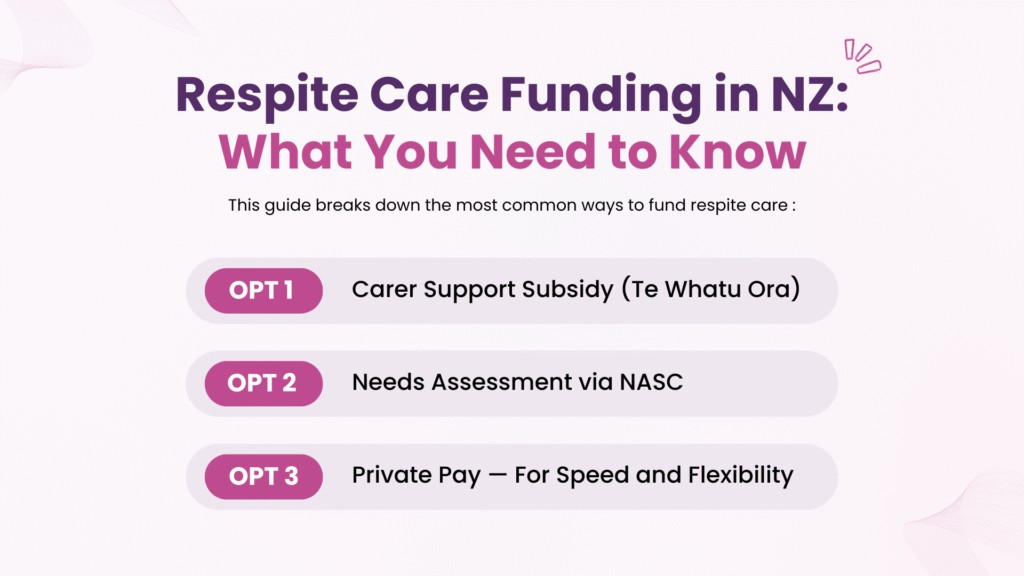Taking a break from caregiving can be a lifeline — emotionally, physically, and mentally. But the cost of respite care is one of the biggest concerns for many families in New Zealand.
The good news? There’s government support available to help cover the cost of short-term care. You just need to know how the system works, what you’re entitled to, and how to access it.
This guide breaks down the most common ways to fund respite care — whether you’re in Christchurch, Tauranga, or anywhere else in Aotearoa.![]()

1. Carer Support Subsidy (Te Whatu Ora)
The most accessible funding option is the Carer Support Subsidy, managed by Te Whatu Ora.
It provides a contribution towards the cost of respite care, for full-time, unpaid carers who support a friend or family member with a disability, health condition, or age-related needs.
Key Facts:
- Covers up to 224 hours per year (around 28 full days)
- You choose how to use it: a full week, a few hours a day, or even overnight support
- Paid as a reimbursement to you, or directly to the care provider
- You don’t need to be the legal guardian — just the main carer
- Must be caring for more than 4 hours a day, 4+ days a week
Learn more and apply here: Carer Support | Te Whatu Ora
Not sure how to start? Contact us — we can guide you through claiming and booking.
2. Needs Assessment via NASC
For people with more complex or long-term support needs, you may be eligible for additional funding through a Needs Assessment and Service Coordination (NASC) process, supported by the Ministry of Health.
What It Offers:
- Fully or partially funded in-home care, day programmes, or residential respite
- Assigned based on level of need, not income
- You or your loved one must meet criteria (e.g. age, disability, condition)
You’ll be assigned a NASC coordinator who will assess the situation and recommend support options.
📌 Tip: It can take time to organise a NASC assessment, so it’s a good idea to plan ahead.
3. Private Pay — For Speed and Flexibility
Sometimes, public funding isn’t enough — or it takes too long to access. In these cases, paying privately for in-home respite care can be the fastest and most flexible option.
Benefits of Private Respite Care:
- Short-notice bookings available
- Fully tailored care plans
- More control over carer selection and schedule
- Ideal for hospital discharge support, holidays, or emergency breaks
Private rates vary between $35–$50 per hour depending on the type of care. Some providers offer bundled packages or overnight support at a set rate. You can explore Hospital to Home Support and Home Help services that qualify.
Do You Qualify for Respite Funding?
To access public funding, you typically need to meet one or more of the following:
- You’re an unpaid carer providing regular support
- Your loved one has a diagnosed disability, illness, or age-related condition
- You’ve been referred by a GP or specialist
- You’ve had a NASC assessment or are applying for one
For eligibility info and downloadable application forms, check out Carers NZ.
Common Misconceptions — Busted
❌ “Respite care is only for people in wheelchairs or on palliative care.”
✅ False. Respite care is for anyone who relies on a carer — including those with memory loss, frailty, anxiety, or mobility issues.
❌ “It’s too expensive to get help.”
✅ Support is available — and even private care can be surprisingly affordable if used for short blocks.
❌ “I’ll lose my subsidy if I don’t use it all at once.”
✅ Not true. You can spread out the 224 hours across the year however suits your family best.
Why Home Carers is a Trusted Choice
Home Carers makes it easy to use your carer support subsidy — or pay privately — with:
- Flexible packages, no minimum hours
- Same-day support in some cases
- Carers trained in dementia and post-hospital recovery
- Serving families across Christchurch and Tauranga
Want help applying for the Carer Support Subsidy or organising respite quickly? Contact us — our team is happy to walk you through it.
